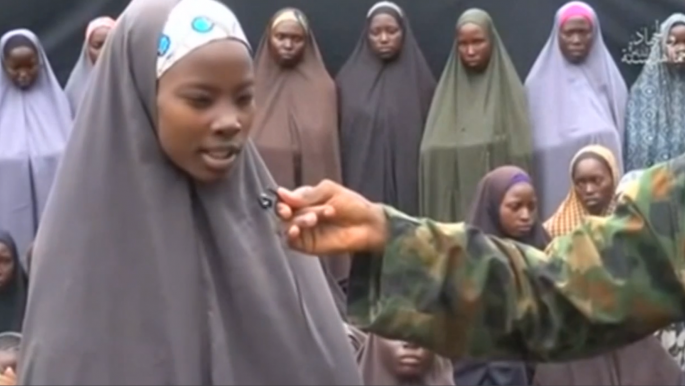Boko Haram releases new video of abducted Chibok girls
Around 50 of the girls are seen with a masked gunman who
threatens that the girls will "never" be returned unless the government releases Boko Haram fighters in captivity.
The militant, who speaks in the Hausa language, says that some of the 276 students who were kidnapped have been killed and seriously wounded in government airstrikes. He also adds that 40 of the girls have been "married" to fighters.
A girl who identifies herself as Maida Yakubu is also interviewed by the fighter, where she reiterates the group's call for an end to airstrikes.
The video ends with images of dead bodies, which the militants say are the victims of airstrikes.
Relief and anguish
The new footage has sparked mixed emotions from the families of the abducted girls, with some expressing relief at seeing their daughters and others speaking of their deep anguish.
Speaking to Reuters, Yakubu Kabo – the father of Miriam Yakubu – said, "I'm very happy because since the abduction of those girls, I didn't see my girl in those videos, past videos that has been passed, but when I saw her, I'm really... I'm very happy. I can be able to sleep today."
 |
| A girl who identifies herself as Miriam Yakubu is interviewed in the video [Screenshot] |
Elsewhere, Samuel Yaga spoke of his "feeling of depression" after viewing the footage featuring his daughter several times.
"The fact is we are overwhelmed with a feeling of depression. It's like being beaten and being stopped from crying. You helplessly watch your daughter but there is nothing you can do. It's a real heartache," Yaga told the BBC.
"As ordinary men, there is nothing we [the other fathers and I] can do on our own. We are just here unable to do anything with our lives. You see your child but someone denies you from having it. They are being forcefully married and they now live in terrible conditions," he continued.
Shifting blame
The video, which is the first to be seen since CNN secured footage in April of some of the captive girls, is seen as part of Boko Haram's attempt to shift the blame for the girls' ill treatment to the Nigerian government. In turn, by painting the efforts to release the girls as a failure, the group hopes that authorities will cease their operations against militant positions.
This attempt to stave off government advances comes in a time when Boko Haram has been forced to scale back their attacks this year, due to external and internal pressures.
In response to the video, Nigerian Information Minister Alhaji Mohammed assured the public that the government was doing all it could to secure the girls' release.
"We are being extremely careful because the situation has been compounded by the split in the leadership of Boko Haram," he said in an emailed statement on Sunday.
"We are also being guided by the need to ensure the safety of the girls," he insisted.
On Monday, Nigeria's army announced that it wants to question journalist Ahmad Salkida and activists Ahmed Bolori and Aisha Wakil about their contact with Boko Haram.
"They must therefore come forward and tell us where the group is keeping the Chibok girls and other abducted persons to enable us to rescue them."
This latest video comes just after a split in the Islamic State affiliated group after a power struggle between two of its leaders.
The video suggests that the girls are being held by the faction loyal to Boko Haram leader Abubakar Shekau, who was recently snubbed by the IS group when they named Abu Musab al-Barnawi as their new governor of its West Africa Province last week.
Al-Barnawi alleges that the group's leader Abubakar Shekau has targeted "fellow Muslims" and killed his own fighters, while Shekau argues that his rival is not fit for the leadership role.
By releasing the video on Sunday, Shekau's faction is thought to be asserting its relevance in the aftermath of the split, as the Boko Haram group as a whole struggles to maintain its campaign of terror in the face of government attacks.



